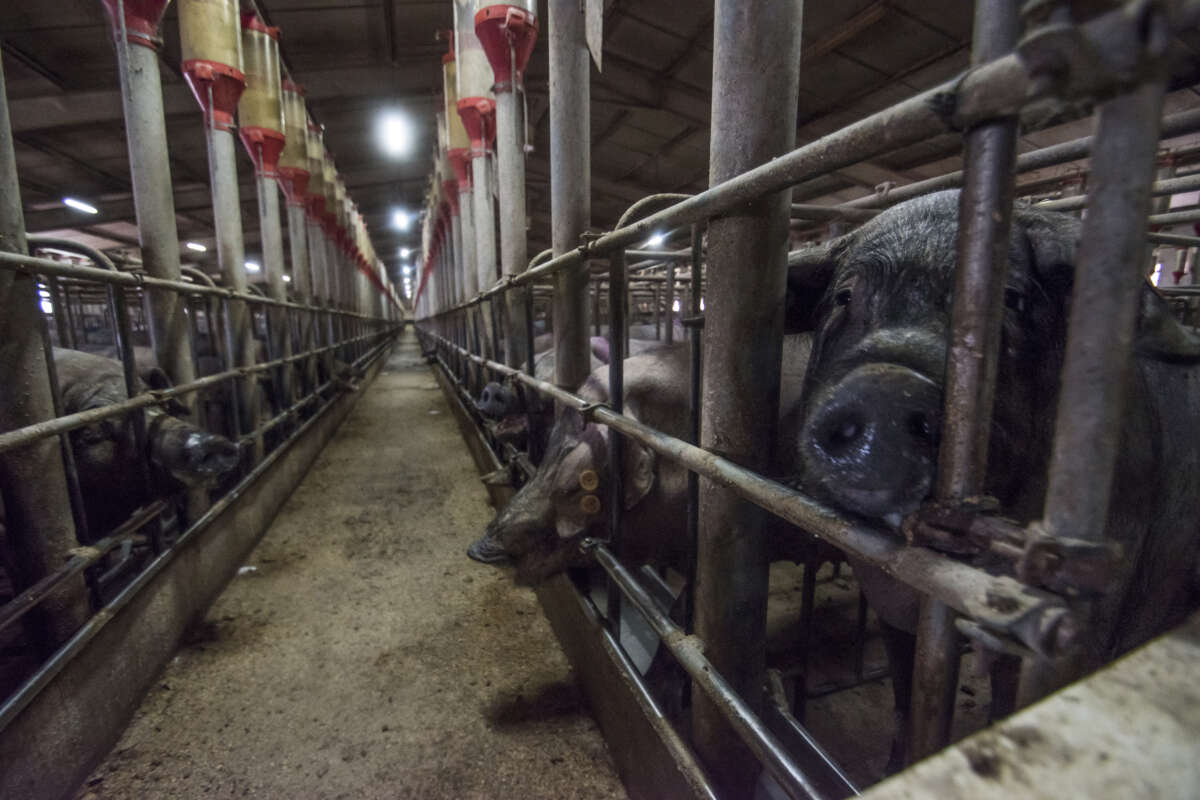A new report from Harvard Law School and New York University argues that the next global pandemic could originate from the U.S. meat supply.
“Covid has infected more than 100 million Americans and killed over a million of them. But the next pandemic may be far worse and might happen sooner than we think,” Ann Linder, one of the report’s lead authors, said in a statement. “The stakes are simply too high for the problem to be ignored.”
In the past decade, many diseases — including HIV/AIDS, Ebola, Zika, and COVID-19 — have originated from animals. Corporate media and right-wing lawmakers have frequently alleged, without evidence, that these zoonotic diseases are the result of supposedly poor hygiene or unsafe cultural practices in the Global South, claims that are based on anti-Asian and anti-African stereotypes. But despite this racist discourse, zoonotic diseases are actually as likely — if not more likely — to spring from commercial factory farms in the U.S., where millions of animals are pushed into close contact with very little government regulation.
“Industrial animal agriculture, which focuses on a single species… presents a much larger risk in terms of both scale of production and the production practices employed, putting workers and surrounding communities at risk,” the report states.
Americans eat more meat per capita than any other country in the world, with about 10 billion land animals raised in the U.S. per year to meet this tremendous demand. As a result, experts say, factory farms are the “perfect storm” for infectious diseases, as packed, stressful environments can compromise an animal’s immune system, making them more susceptible to infection which can then be passed on to humans. “If you actually want to create global pandemics, then build factory farms,” Michael Greger, author of Bird Flu: A Virus of Our Own Hatching, has said.
Industrial animal agriculture “produces and processes animals on a vast scale in the United States, accounting for about 98% of all meat sold on supermarket shelves,” Linder told Truthout. “This movement towards intensification has created and compounded risk factors for disease. Animals are held together by the thousands in high-density warehouses with poor ventilation, poor welfare, and high levels of stress. These conditions can allow disease to spread rapidly from one animal to the next.”
The effects of another global pandemic would not be felt equally. Indigenous, Black and Latinx people were disproportionately affected by the COVID-19 pandemic and experienced higher rates of infection, hospitalization and death. Factory farm workers, many of whom are Black and Latinx, are especially at risk.
“The risk of spillover is greatest to the individuals who work inside these facilities — who breathe the ammonia-rich air every day, who handle live animals and dead ones, as well as their waste,” Linder told Truthout. “We also know these individuals, though they are the most vulnerable, may also be among the least likely and the least able to report disease or seek medical care.”
Factory farm workers are often low-income and undocumented, making them vulnerable to violence and raids from U.S. Immigration and Customs Enforcement (ICE). Many undocumented workers avoid seeking health care out of fear of being reported to authorities.
Factory farm and meatpacking workers were hit especially hard by COVID-19. In April 2020, Tyson Foods managers organized a “winner-take-all betting poll” where they wagered how many of their employees in Waterloo, Iowa, would contract the infection. The managers were later fired for conducting the betting ring, and COVID-19 safety failures at the meatpacking plant resulted in wrongful death lawsuits and condemnation from the United Food and Commercial Workers (UFCW) International Union, which represents over 250,000 workers in meatpacking and food processing plants.
“At every turn marginalized communities are at increased risk: in the dirty, dangerous jobs they work for lack of other options; in their lack of access to basic legal protections and to health care; even in their homes, which are more likely to be located near disease and pollutant emitting animal production facilities,” Delcianna J. Winders, Animal Law and Policy Institute Director at Vermont Law and Graduate School, told Truthout.
Factory farm workers are also at a higher risk for pathogen transmission for zoonotic diseases. “Workers from poor and underserved communities supply labor for many of the animal markets examined here and accordingly may be more likely to be affected by zoonoses,” the report says. Studies estimate that swine workers in particular have a 30 times greater risk of contracting zoonotic influenza infection than the general public. During recent outbreaks of the avian influenza in humans, mostly poultry workers, mortality ranged from 30 percent to 60 percent, according to the report.
The Center for Disease Control estimates that 6 out of 10 infectious diseases have the potential to be zoonotically transmitted, noting that disease outbreaks at factory farms occur relatively often. The U.S. has recorded more “swine flu” infections than any other country since 2011, and the 2009 swine flu pandemic killed more than 12,000 people in the country. In 2015, more than 50 million chickens were killed to contain an avian influenza outbreak. There was a similar outbreak just seven years later, affecting flocks in 46 states and resulting in the culling of 57 million birds.
During the 2022 avian influenza outbreak, Richard Webby, director of the World Health Organization’s Collaborating Center for Studies on the Ecology of Influenza in Animals, told NPR, “I’m hopeful that this is not the new normal for us.”
The Harvard Law School report, however, shows that the U.S. is at risk of becoming ground zero for a new global pandemic unless policymakers move quickly to address the causes of zoonotic disease risk.
“We have the capabilities to radically reduce our risk—to lock the cockpit door,” the report concludes. “Along with this capability comes great responsibility and moral obligation to do so. This is the sober challenge we are left with.”
